新目标七年级英语下册复习学案unit教案
- 格式:doc
- 大小:110.50 KB
- 文档页数:17
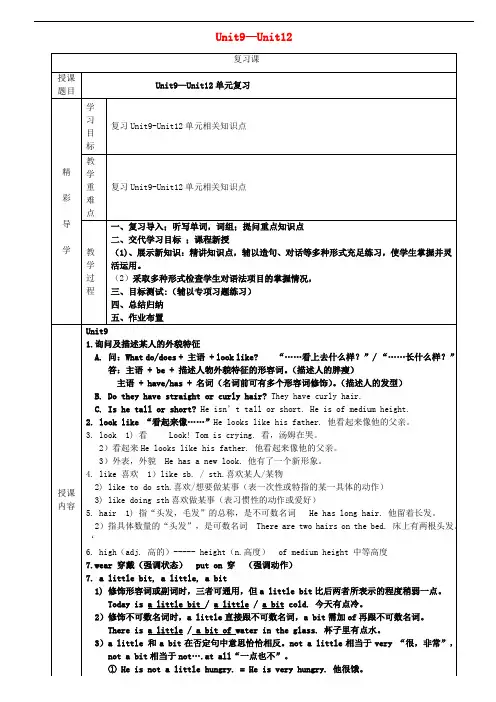

新目标七年级下册复习教案文档编制序号:[KK8UY-LL9IO69-TTO6M3-MTOL89-FTT688]新目标英语七年级下复习资料(金文华专辑)◆Unit ’s the post office目标语言:ask for and give directions on the street重点句型:Is there a bank near here Yes, there’s a bank on Center Street.Is there a supermarket Yes, there is. No, there isn’t.Where’s the supermarket It’s next to the library.The pay phone is across from the library.The pay phone is next to the library.The pay phone is between the post office and the library. The pay phone is on Green Street.Just go straight and turn left.It’s down Bridge Street on the right. It’s next to a supermarket.Is there a big supermarket near where youlive重点词组:across from, on the street, between…and…, next to, in the neighborhood, go straight, turn left, on the right(left), on the avenue, take a walk, in the hotel, the beginning of, have fun doing, on a bench, the way to, take a taxi, go down, go through, have a good trip,welcometo+n.,the way to+n去。
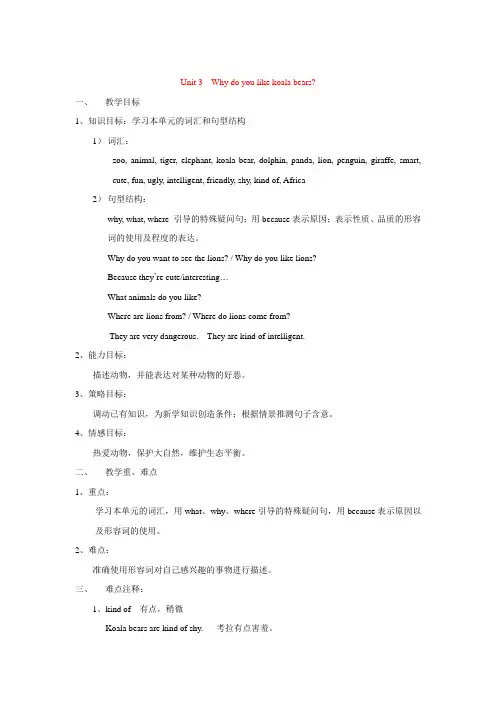
Unit 3 Why do you like koala bears?一、教学目标1、知识目标:学习本单元的词汇和句型结构1)词汇:zoo, animal, tiger, elephant, koala bear, dolphin, panda, lion, penguin, giraffe, smart,cute, fun, ugly, intelligent, friendly, shy, kind of, Africa2)句型结构:why, what, where 引导的特殊疑问句;用because表示原因;表示性质、品质的形容词的使用及程度的表达。
Why do you want to see the lions? / Why do you like lions?Because they’re cute/interesting…What animals do you like?Where are lions from? / Where do lions come from?They are very dangerous. They are kind of intelligent.2、能力目标:描述动物,并能表达对某种动物的好恶。
3、策略目标:调动已有知识,为新学知识创造条件;根据情景推测句子含意。
4、情感目标:热爱动物,保护大自然,维护生态平衡。
二、教学重、难点1、重点:学习本单元的词汇,用what、why、where引导的特殊疑问句,用because表示原因以及形容词的使用。
2、难点:准确使用形容词对自己感兴趣的事物进行描述。
三、难点注释:1、kind of 有点,稍微Koala bears are kind of shy. 考拉有点害羞。
Kind 还有“种类”的意思,如:各种各样的all kinds ofWe have all kinds of beautiful flowers in our school.2、China n. 中国Africa n.非洲China 和Africa都是专有名词,首字母都应该大写,而且和介词in连用。
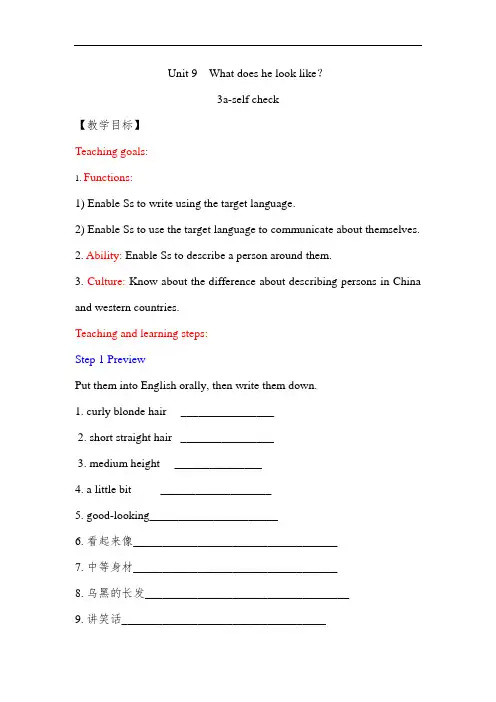
Unit 9 What does he look like?3a-self check【教学目标】Teaching goals:1. Functions:1) Enable Ss to write using the target language.2) Enable Ss to use the target language to communicate about themselves.2. Ability: Enable Ss to describe a person around them.3. Culture: Know about the difference about describing persons in China and western countries.Teaching and learning steps:Step 1 PreviewPut them into English orally, then write them down.1. curly blonde hair ________________2. short straight hair ________________3. medium height _______________4. a little bit ___________________5. good-looking______________________6. 看起来像___________________________________7. 中等身材___________________________________8. 乌黑的长发___________________________________9. 讲笑话___________________________________10. 下国际象棋___________________________________二、用be或have的适当形式填空。
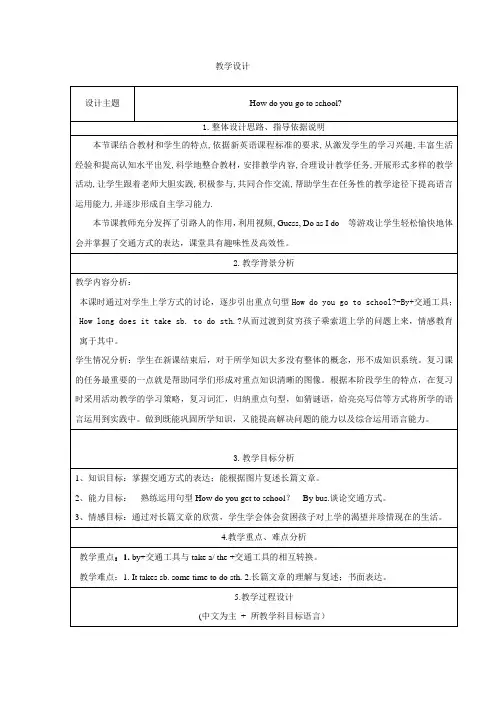
教学设计设计主题How do you go to school?1.整体设计思路、指导依据说明本节课结合教材和学生的特点,依据新英语课程标准的要求,从激发学生的学习兴趣,丰富生活经验和提高认知水平出发,科学地整合教材,安排教学内容,合理设计教学任务,开展形式多样的教学活动,让学生跟着老师大胆实践,积极参与,共同合作交流,帮助学生在任务性的教学途径下提高语言运用能力,并逐步形成自主学习能力.本节课教师充分发挥了引路人的作用,利用视频, Guess, Do as I do等游戏让学生轻松愉快地体会并掌握了交通方式的表达,课堂具有趣味性及高效性。
2.教学背景分析教学内容分析:本课时通过对学生上学方式的讨论,逐步引出重点句型How do you go to school?-By+交通工具;How long does it take sb. to do sth.?从而过渡到贫穷孩子乘索道上学的问题上来,情感教育寓于其中。
学生情况分析:学生在新课结束后,对于所学知识大多没有整体的概念,形不成知识系统。
复习课的任务最重要的一点就是帮助同学们形成对重点知识清晰的图像。
根据本阶段学生的特点,在复习时采用活动教学的学习策略,复习词汇,归纳重点句型,如猜谜语,给亮亮写信等方式将所学的语言运用到实践中。
做到既能巩固所学知识,又能提高解决问题的能力以及综合运用语言能力。
3.教学目标分析1、知识目标:掌握交通方式的表达;能根据图片复述长篇文章。
2、能力目标:---熟练运用句型How do you get to school?---By bus.谈论交通方式。
3、情感目标:通过对长篇文章的欣赏,学生学会体会贫困孩子对上学的渴望并珍惜现在的生活。
4.教学重点、难点分析教学重点:1. by+交通工具与take a/ the +交通工具的相互转换。
教学难点:1. It takes sb. some time to do sth. 2.长篇文章的理解与复述;书面表达。
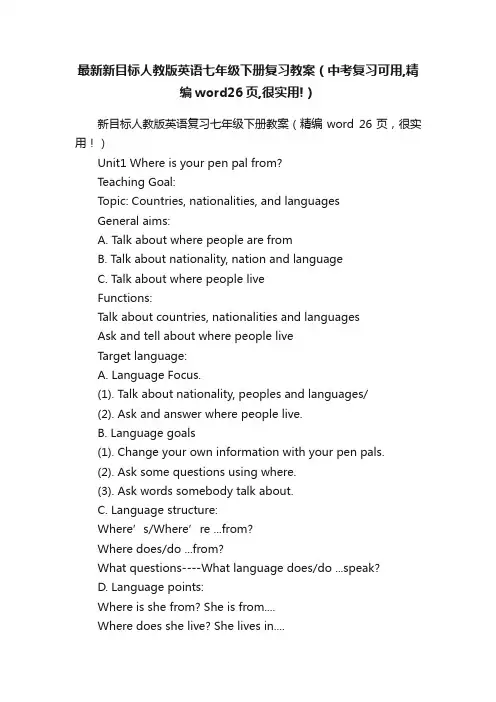
最新新目标人教版英语七年级下册复习教案(中考复习可用,精编word26页,很实用!)新目标人教版英语复习七年级下册教案(精编word 26页,很实用!)Unit1 Where is your pen pal from?Teaching Goal:Topic: Countries, nationalities, and languagesGeneral aims:A. Talk about where people are fromB. Talk about nationality, nation and languageC. Talk about where people liveFunctions:Talk about countries, nationalities and languagesAsk and tell about where people liveTarget language:A. Language Focus.(1). Talk about nationality, peoples and languages/(2). Ask and answer where people live.B. Language goals(1). Change your own information with your pen pals.(2). Ask some questions using where.(3). Ask words somebody talk about.C. Language structure:Where’s/Where’re ...from?Where does/do ...from?What questions----What language does/do ...speak?D. Language points:Where is she from? She is from....Where does she live? She lives in....What language does she speak? She speaks....Vocabulary: Words about countries, languagesTeaching design: The whole unit needs 5 periods, 4 for new lessons and 1 for testPeriod 1 ( 1a----Grammar Focus )Key points:Where is your/John's pen pal from? He/She is from...Where does he/she live? He/She lives in....Pre-task (Homework for preview):Let the Ss give themselves pen pals and they should write down their pen pals' information, such as their names, countries and cities they live even the language they speak.T can give the Ss an example meanwhile T gives the different countries which can be used by the Ss. T gives the Ss Chinese words for the countries, they are following: 加拿大,法国,日本,美国,澳大利亚,新加坡,英国,中国( The Ss can look them up in the dictionary if they are new for them)The example is following:Name: Curry MurayAge: 75From(Nationality): the United StatesCity: New YorkLanguage: EnglishTeaching Steps:Step 1 Leading-in The information of the teacher's own pen pal's information.“I have a pen pal. His name is Curry Muray. He is from the United States. Do you have a pen pal? Where is your pen pal from? What's your pen pal's name?”Different students say the information about their own penpals. T should choose the different countries. T writes the different countries on the Bb(both Chinese and English) Step 2 LearningSection A 1a Learn the new words on the Bb. The new words are:pen pal; Canada; France; Japan; the United States(the US/the USA/America); Australia; Singapore; the United Kingdom(the U.K./Great Britain/England)Pay attention to the pronunciation of the new words.Step 3 Listening1b Listen and circle the countries in 1a they learnedStep 4 CompetitionTwo groups of students to write the new words to see which group does better. First write down the Chinese words with looking at the English meanings, then write down the English words with looking at the Chinese meanings.(This step is a memory game. It can help the Ss consolidate the new words they learned)Step 5 Pair work1c Practice the following conversation:---Do you have a pen pal? ---Yes, I do.---Where’s your pen pal’s from? ----He/She is from .... (Write it down on the Bb) First T has a conversation with one student as an example then let the Ss practice in pairs. At last let several pairs do it again in class.Step 6 Leading-inRevise the countries names with looking at the Bb. Then T writes down the city names on the Bb. Let the Ss try to find out which countries the cities are in. The city names are following: Toronto; Paris; Tokyo; New York; Sydney; Singapore; LondonStep 7 Learning2a Learn the city names together with the whole class just like Step 22b Listen and circle the cities and countries2c Listen and complete the chartHave a similar competition to consolidate the new words in this part.Step 8 Pair workT has a conversation with one student like the following:---Do you have a pen pal? ---Yes, I do.---What's your pen pal's name? ---His/Her name is....---Where is your pen pal from? ---He/She is from...---Where does he/she live? ---He/She lives in....(Write it down on the Bb)Let the Ss practice after the T's example in pairs then several pairs do it in class.Step 9 Exercise1. My pen pal is from Australia.(划线提问)2. John’s pen pal is from Japan. (划线提问)3. He lives in Paris. (划线提问)Homework:Read and copy the new words .Copy the sentences in Grammar FocusMake up the questions about Jodie in 2c The questions are: Does Jodie have a pen pal? Where is Jodie's pen pal from? Where does he/she live? What's his/her name?(This one can be chosen by themselves)Period 2 (3a----Section B 2c)Preview(Pre-task):Add another information about their pen pals----theirlanguage on the cardKey points:What language does sh e/he speak? She/He speaks….Does she/he have any brothers and sisters?Does she/he speak English?Teaching Steps:Step 1 Revision1. Revision and dictation of the new words2. Revise the drills they learned yesterday.(by pair work and grammar exercise)Step 2 Leading-inT has a conversation with one student. The conversation is following:---Do you have a pen pal? ---Yes, I do.---What’s your pen pal’s name? ---His/Her name is….---Where is your pen pal from? ---He/She is from…---Where does he/she live? ---He/She lives in….---What language does he/she speak? He/She speaks…Write the new words on the Bb. They are following: English Chinese Japanese FrenchStep 3 LearnLearn the new words with the whole class.Finish 3a with the students3b Pair work T still does an example with one student Then the Ss practice in pairs. The example is following:--Curry Muray is my pen pal. He is from the United States.---What language does he speak?---He speaks English.Step 4 Practice1. Section B 1a Match the countries with their languages.2. Memory game Let the Ss repeat the following sentences:People in China speak Chinese. People in Japanese speak Japanese. People in the USA, UK, Australia and Canada speak English. People in Singapore speak English and Chinese. People in France speak French.3. 2a Listen and number the questions they hear4. 2b Listen again and write short answers to the questions in 2a(Good students can finish the two tasks for one time)Step 5 Pair workPractice the conversation of 2a in pairsPay attention to the language points:Does she have any brothers and sisters? (any and)Does she speak English? (Write them on the Bb)2c The Ss makes up their own dialogue about more information of their pen pals by using the drills in 2a.Step 6 Group workFour students as a group make a survey about pen pals by asking and answering each other. Their questions are about their pen pa ls’ names, nationalities, cities, languages and their favorite subjects or more informationAt last if time possible several students do the report in class about their surveys.Step 7 HomeworkCopy the new words they learned today and the sentences in 2aGood students can write a report about their surveys about pen pals of their own groups.Period 3(3a----3c) A reading lessonStep 1 Revision1.Revision and dictation of the new words and expressions2.Revise conversations they learned yesterday.3.Revise the key points by grammar exerciseHe speaks English. (变一般疑问句和特殊疑问句)Step 2 Reading3a Read the letter and write answers to the questions in the box.Read it again and let the Ss discuss in groups(4 as a group) to design an information card for Bob.Let the Ss read aloud. First after the T or the tape then by themselves.T must make sure the Ss can read it correctly and fluently.T write the key words on the Bb to help the Ss retell the letter.The key words are following:Bob, T oronto, want, a very interesting country, 14, in Nov., can speak, brother, Paul, sister, Sarah, pen pals in the UK and Australia, l ike going …and playing…, favorite subject, fun, math, difficult, write toLearn the language points in the letter:1)I want a pen pal .want sth./sb.( musician wanted)want to do sth. I want to play soccer with my friends.want sb. to do sth. My parents want me to do homework now.2)I like going to the movies …。

新目标英语七年级复习课范镇二中王霞Unit8 I’dlike some noodles〔复习任务〕1.能够掌握本单元的单词和“点餐”时所用句型。
2.能够运用本单元表达意愿的would like句型点你最喜欢吃的食物、并对涉及电话订餐时间和地址作出回答,同时能区分可数名词及不可数名词。
〔自主学习,基础回顾〕1.Words and phrases①面条________ ②洋白菜_______③土豆______pl_______④大的,宽广的______(反)______⑤饺子_______pl_______⑥粥,糊_________⑦果汁________⑧鸡肉________⑨原因________⑩菜单_________ 11)一碗面条____________12)橘子汁_____________13)绿茶____________14)想要,愿意___________15)饺子屋___________16)甜点屋____________17)一小/中/大碗面条_____________18)牛肉西红柿面_____________________2.Sentences and language points〈1〉你想要哪种面条?(P47 1a)_____________________________________________此句中kind作名词“种类”如:一种__________各种各样的___________同种类的_______另外,kind还可作形容词“友爱的”,如:她是个可亲的女孩。
______________________________也可作副词“有点儿,稍微”。
如:熊猫有点逗人喜爱。
____________________________________〈2〉我想要牛肉面。
(P48 2c)________________________________________________译:牛肉和西红柿面条_____________________加羊肉和土豆的面条__________________〈3〉---他想要多少(多大碗装)的面条?________________________------(P48 Grammar Focus)---他想要一小碗/中号碗/大碗面条。

5篇2021七年级英语下册单元复习教案新目标英语七年级英语下册单元复习教案新目标英语1Unit 1 Can you play the guitar ?】1.can+动词原形,它不随主语和数而变化。
(1)含有can的肯定句:主语+can+谓语动词的原形+其他。
(2)变一般疑问句时,把can提前:Can+主语+动词原形+其他?肯定回答:Yes,主语+can。
否定回答:No,主语+can't.(3)含有can的否定句:主语+can't+动词的原形+其他。
(4)含有can的特殊疑问句:特殊疑问词+can+主语+动词原形+其他?2.may+动词的原形。
(may为情态动词)一般疑问句是把may提前,肯定回答是:Yes,主语 +may。
否定回答是:No,主语+mustn't。
或please don't。
join+某个组织,俱乐部,party,参军,党派等“加入”Join sb. “参加到某人中” join in (doing)sth “加入做......,参加某个活动” Joinin=take part in +活动,比赛3.说某种语言:speak+语言4.play+球、棋、牌;play+the+乐器。
5.擅长于(做)什么:be good at +名词/动ing6.帮助某人做某事:help sb. (to ) do sth. help sb. with sth.7.我能知道你名字吗?May I know your name?8.想要做什么:want to do sth 例如:I want to learn about art.9.What club do you want to join?I want to join the chess club and the basketball club.10.What club does Tom want to join? He wants to join the swimming club .11.He can’t play the violin or the piano. Can you help kids with swimming?12.Why do you want to join the English club? Because I want to learn English well.七年级英语下册单元复习教案新目标英语2Unit 2 What time do you go to school ?】1.what time和when引导的特殊疑问句。
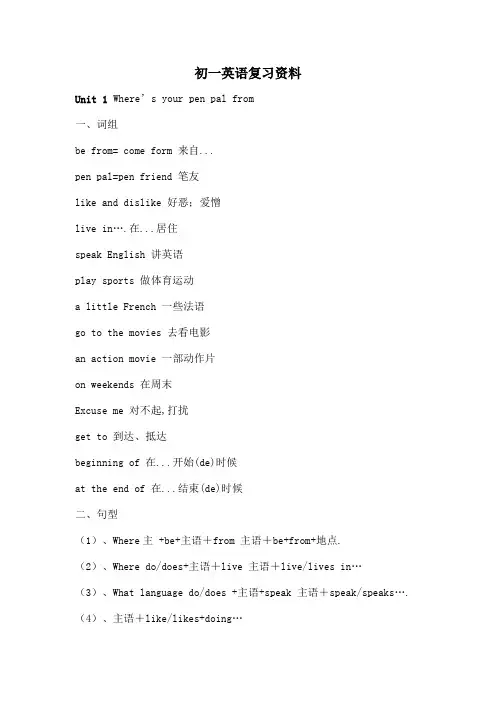
初一英语复习资料Unit 1 Where’s your pen pal from一、词组be from= come form 来自...pen pal=pen friend 笔友like and dislike 好恶;爱憎live in….在...居住speak English 讲英语play sports 做体育运动a little French 一些法语go to the movies 去看电影an action movie 一部动作片on weekends 在周末Excuse me 对不起,打扰get to 到达、抵达beginning of 在...开始(de)时候at the end of 在...结束(de)时候二、句型(1)、Where主 +be+主语+from 主语+be+from+地点.(2)、Where do/does+主语+live 主语+live/lives in…(3)、What language do/does +主语+speak 主语+speak/speaks…. (4)、主语+like/likes+doing…三、日常交际用语1-Where is your pen pal from -He’s from China.2-Where does she live --She lives in Tokyo.3-Does she speak English -Yes, she does/No, she doesn’t. 4-Is that your new pen pal -Yes,he is /No,he isn’t.5-What language does she speak -She speaks English.Unit 2 Where’s the post office一、词组 post office 邮局pay phone 投币式公用next to 在...隔壁across from 在...对面in front of 在...前面between…and…在...和...之间on a street 在街上in the neighborhood 在附近on the right/left 在右边/在左边on one’s right/left 在某人(de)右边/左边turn right/left 向右/左转take a walk 散步have fun 玩得开心the way to …去...(de)路take a taxi 打(de)/乘出租车go down(along)…沿着...走go through...穿过...have a good trip 旅途愉快二、句型(1)、Is there a bank near here Yes, there is .It’s on Centre Street. No,there isn’t.(2)、Where’s the sumpermarket It’s next to the library.(3)、Bridge Street is a good place to have fun.(4)、I hope you have a good trip.(5)、If you are hungry,you can buy food in the restaurant.(6)、Talk a walk though the park..(7)、enjoy后接名词或动词-ing形式. Do you enjoy(=like) your work Do you enjoy(=like) living in the city三、日常交际用语(1)、Is there a ….句型. -Excuse there a hotel in the neighborhood. -Yes, there is. isn’t(2)、Where is …句型Eg: -Where is the park, please -It’s behind the bank. (肯定回答) -I’m sorry I don’t know. (否定回答) (3)、Which is the way to +地点句型.例如: - Which is the way to the library.(4)、How can I get to +地点句型.例如: -How can I get to the restaurant(5)、Can you tell me the way to +地点句型.例 - Can you tell me the way to the post office (6)、Let me tell you the way to my house.(7)、Just go straight and turn left.Unit 3 Why do you like koalas一、词组want to do sth .想要做某事want sb to do sth 想要某做某事want sth 想要某物Let sb do sth 让某人做某事kind of 有几分\种类a kind of 一种……years old …年龄如:ten years old 十岁like to do sth 喜欢做某事like doing sth play with …与...一起玩be quiet 安静during the day 在白天at night 在夜间have a look at.. 看...one…the other 一个...另一个...二、句型(1)、-why do you like pandas -Because they’re very cute.(2)、-Why dose he like koalas -Because they are kind of interesting.(3)、-Where are lions from -Lions are from South Africa.(4)、-What animals do you like -I like elephants.三、日常交际用语(1)、-Let’s see the lions.(2)-Why do you want to see the lions -Becase they are very cute.(3)-Do you like giraffes Yes,I do./ No,I don’t(4)-What other animal do you like _I like dogs,too.other+ 名词(de)复数.表示没有特定(de)数量范围 the other+名词(de)复数表示有特定(de)数量范围.(5)-Why are you looking at me -Because you are very cute.(6)-Let us play games. –Great Let me see.Unit 4 I want to be an actor.一、词组want to be+职业想要成为...shop assistant 店员bank clerk 银行职员work with 与...一起工作work hard 努力工作work for 为...而工作work as 作为..而工作get.. from…从...获得...give / 把某物给某人at night 在夜间talk to /with 与…讲话go out to dinners 外出吃饭in a hospital 在医院newspaper reporter 报社记者movie actor 电影演员二、句型(1)-What do/does+某人+do 例:-What do you do-I’m a student. -What dose he do He’s a teacher.(2)-What do/does+某人+want to be 例:What do you want to be-I want to be a teacher. -What does she want to be She wants to be a nuser.(3)-Where does your sister work -She works in a hospital.(4)-Does he work in the hospiat does/No,he doesn’t(5)-Does she work late -Yes,she does/ doesn’t(6)-英语中询问职业(de)几种表达方式: What do/does …do What is…What is your father What’s one’s job例:What’s your father’s jobUnit 5 I’m watching TV.一、词组do homework 做家庭作业watch TV 看电视eat dinner 吃饭;就餐clean the room 打扫房间read newspaper/a book 看报纸/看书go to the movies 看电影write a letter 写信wait for 等待;等候talk about 谈论....play basketball/soccer/ 打篮球/踢足球take photos 拍照 TV show 电视节目Some of... ...中(de)一些a photo of my family school 在学校be with 和...一起in the tree 在树上二、句型(1)-What+be+主语+doing ….正在做什么 -主语+be+doing... …正在做某事. 例:-what are you doing -I’m doing my homework.(2)-Thanks for …为...而感谢例:Thanks for your letter.(3)-Here are/is…例:Here are some of my photos. Here is a photo of my family.(4)-That sounds good.(5)-This TV show is boring.三、日常交际用语(1)-Do you want to go to the movices –Sure.(2)-When do you want to go –Let’s go at seven.(3)-Where do people play basketball –At school.(4)-What’s he waiting for-He’s waiting for a bus.(5)-What’s he reading He’s reading a newspaper.1)现在在进行时(de)形式是:助动词be(am,is,are)+动词-ing形式(也叫现在分词),表示现在(说话(de)瞬间)正在进行或发生(de)动作.2)现在进行时(de)肯定句形式主语+be(am,is,are)+动词现在分词+其他I’m watching TV.3)现在进行时(de)否定句形式主语+be(am,is,are)+not+动词现在分词+其他 They are not playing soccer. 4)现在进行时(de)一般疑问句形式及回答: Is(am,are)+主语+动词现在分词+其他 Yes,主语+is/am/are. No,主语+isn’t/aren’t/am not. Are you reading Yes,I am. No,I am not.5) 现在进行时(de)特殊疑问句形式: 特殊疑问词+is/am/are+主语+现在分词+其他例:What is your brother doing6) 动词+ing形式(现在分词)(de)构成. 1一般情况下在动词词结尾加-ing. 如: eat--eating, do—doing,clean—cleaning, play—playing, 2以不发音(de)元音字母e结尾(de)动词,先去掉e再加-ing.如:take--taking,write—writing,have-having come— 3词尾如果是以一个辅音字母结尾(de)重读闭音节词.应该先双写这个辅音字母,再加-ing. 如:run—runing,sit—sitting ,swim—swimming. Shop—shopping. put—putting,sit—sittingUnit 6 It’s raining一、词组Around The World 世界各地On vacation 度假Take photos 拍照On the beach 在海边a group of people 一群人play beach volleyball 打沙滩排球be surprised 惊讶(de)be surprised at sth./sb.对某人或某人感到惊讶in this heat 在酷暑中be relaxed 放松have a good time 玩得很痛快in different kind of weather 在不同(de)天气里Thank sb for(doing)sth由于(做)某事而感谢某人How’s it going 近况如何Some…others…一些…另一些…Look like..看起来像...二、句型/日常交际用语(1)-How’s the weather(+地点) –It’s raining(2)-What’s the weather like—It’s sunny./It’s cold and snowing.(3)-How’s it going –Great./Not bad.(4)Thanks you for joining CCTV’s Around The World show(5)-Is Aunt Wang there –Yes,she is/No,she isn’tUnit 7 What dose he look like一、词组look like 看起来像....curly /short/straight/long hair 卷/短/直发medium height/build 中等高度/身体a little bit 一点儿…a pop singer 一位流行歌手wear glasses 戴眼镜have a new look 呈现新面貌go shopping 去购物the captain of the basketball team 篮球队队长Nobody knows me 没有人认识我二、句型1) --What does he look like --He’s really has short hair.2) --She has beautiful,long black hair.3) --I don’t think he’s so great .4) --What do you look like I’m ’m thin.5) --What do they look like- --They are medium height.6) --She never stops talking. --Stop doing(sth)表示停止正在干(de)事. 如:He stop listening --stop to do (sth)表示停下来去做某事如:He stops to listen.7)I can go shopping and nobody knows me.Unit 8 I’d like some noodles.1.词组x kb1 .c o mwould like 想要a large/medium/small bowl 大碗/中碗/小碗what size 什么尺寸orange juice 桔汁green tea 绿茶phone number 号码as well as 而且what kind of 表示….(de)种类a kind of 一种…some kind of 许多种…a bowl of rice 一碗米饭a bottle of orange juice 一瓶桔子汁three oranges 三个桔子(可数)a bottle of orange j 一瓶桔子汁(不可数)some chicken 一些鸡肉(不可数)three chicken三只小鸡(可数)二、句型1)What kind of … would you like 你想要… EG:--What kind of noodles would you like --Beef and tomato .2)We have lare ,medium,and small bowls.3)I like dumplings,I don’t lkee noodles.三、日常交际用语(1)—Can I help you --I’d like some noodles. please.(2)--what kind of noodles would you like --I’d like mutton and potato noodles. Please.(3)—Would you like a cup fo green tea --Yes,please./No,thanks would like后面还可以跟不定式.即: A: would like to .想要做某事. He would like to see you today. B:would like 想要某人做某事 What would you like me to do.Unit 9 How was yu weekend一、词组do one’s homework 做某人(de)家庭作业如:do my homework 做我(de)家庭作业play +运动或棋类如:play soccer 踢足球 play chess 下棋 play +乐器如:play the guitar 弹吉他 go to the movies 去看电影do some reading 阅读study for the (math) test 准备(数学)考试stay at home 呆家里go to summer camp 去夏令营go to the mountains 去爬山visit sb 拜访某人go shopping 去购物last month 上个月three days ago 三天前yesterday 昨天look for 寻找go for a walk 散步in the morning/afternoon/evening 在早上/在下午/在晚上play computer games 玩电脑游戏It was time to sth 该...(de)时候了二、句型新课标第一网(1)I visited my aunt last weekend.(2)-- How was your weekend --It was great./OK(3)—It was time to go home.三、日常交际用语(1)—What did you do last weekend --On Saturday morning,I played teenis.(2)—How was your weekend --It was went to the brach.一般过去时态一般过去时态表示过去发生(de)动作或存在(de)状态,动词通常用一般过去式来表示,除动词be(de)过去式was/were有人称变化,其他都没人称(de)变化.过去式(de)构成 (1) 一般情况下在动词词尾加-ed.如: stay—stayed help—helped visit-visited (2) 词尾是e(de)动词加-d. 如:like—liked live—lived (3) 以一个元音字母加一个辅音结尾(de)重读闭章节应双写该辅音字母,再加-ed.如: stop—stopped plan—planned (4) 以辅音字母+y结尾(de)动词,要将y改为i再加-ed.如: study—studied worry—worried (5) 不规则动词(de)过去 am/is—was are—were have-had go—went find—found do—did see-sawUnit 10 Where did you go on vacation一、词组 pretty good 相当好;不错in the conner 在角落kind of boring 有点无聊be lost 迷路feel happy 感到高兴be fun 很有趣on vacation 在度假Central Park 中央公园the Great Wall 长城the Palace Museum 故宫Tian’an Men Square 天安门广场二、句型(1)—Where did you go on vacation --I went to the breach.(2)—How was the weather --It was hot and humid.(3)--It was kind of boring(4)—That made me feel very happy.(5)--We had great fun playing in the water. --have great fun doing sth表示“愉快地做某事”,“做某事很有趣”(6)I helped him find his made me feel very happy. help sb.(to).帮助某人做某事(to可省) make 使某人做某事 let Let me help you carry(搬动) it.(7)I found a small boy crying in the conner. find sth.发现某人正在做某事. find 发现某人做某事(整个过程)Unit 11 What do you think of game shows一、词组talk show 谈话节目soap opera 肥皂剧sports show 体育节目game show 比赛节目think of 认为how about……怎么样=what about…in fact 事实上a thirteen-year-old boy 一个十三岁(de)男孩= The boy is thirteen years oldtalk to(with)…跟…谈话thanks for…为…感谢each student 每个学生key ring 钥匙链baseball cap 棒球帽the school magazine 校刊can’t stand 不能忍受don’t mind 不介意/无所谓/不在乎二、句型(1)—What do you think of situation comedy -- I love them(2)—I asked students about fashion.(3)—This is what I think.(4)--I don’t mind what young people think of me(5)—Can you please put my letter in next month’s magazine三、日常交际用语(1)—What do you think of suop operas --- I love them/I don’t mind them/I can’t stand them/I don’t like.(2)—How about you ---I .(3)--What do you think of … --=How do you like…如:What do you think of the picture =How do you like the pictureUnit 12 Don’t eat in class.一、词组school rules 学校规章制度break the rules 违反规章制度in the hallways 在过道listen to music 听音乐in the music room 在音乐教室里in the dining hall 在餐厅sports shoes 运动鞋gym class 体育课after school 放学后have to do 不得不做too many 太多get up 起床by ten o’clock 十点之前make dinner 做饭the children’s palace 少年宫二、句型(1)—Don’t arrive late for class.(2)—We can’t listen to music in the hallways,but we can listen to it outside.(3)—What else do you have to do -- We have to clean the classroom.(4)--Can we wear hats in school --Yes,we can/ No,we can’t.(5)-Do you have to wear a uniform at school -Yes,we do /No,we don’t.重难点精析祈使句通常用来表示命令、请求、禁止、建议、警告等语气.它(de)主语you(听话人)通常省略.其构成通常有以下几种形式.1)Be型(即系动词原型be+表语+其他). 如:Be quiet,please. 否定句Don’t + be+表语+其他. 如:Don’t be angry.2)Do型(即系动词原形+宾语+其他).如: Open you books,please. 否定句Don’t +实义动词原形+宾语+其他. 如:Don’t eat in the classroom.3)Let型(即Let+宾语+动词原形+其他)如: Let me help you. Let’s go at six o’clock. 否定句一般在宾语后加not.如: Let’ not watch TV.4)No+V-ing型(此种形式通常用于公共场合(de)提示语中,意为“禁止做某事“)如: No smoking 严禁吸烟 No talking 不许交谈 No passing 禁止通行 No parking 不许停车。
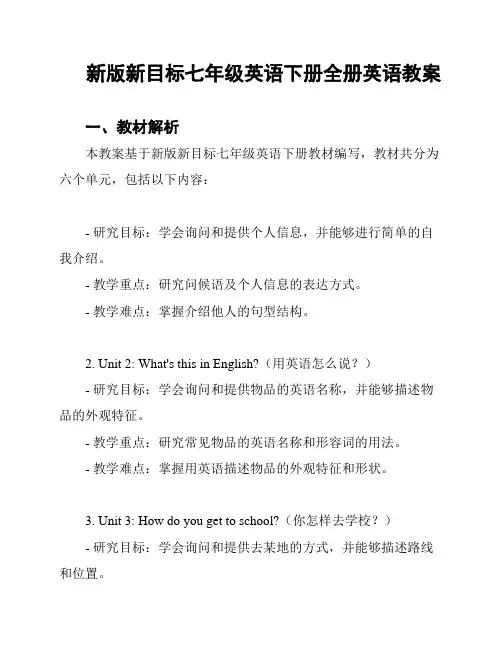
新版新目标七年级英语下册全册英语教案一、教材解析本教案基于新版新目标七年级英语下册教材编写,教材共分为六个单元,包括以下内容:- 研究目标:学会询问和提供个人信息,并能够进行简单的自我介绍。
- 教学重点:研究问候语及个人信息的表达方式。
- 教学难点:掌握介绍他人的句型结构。
2. Unit 2: What's this in English?(用英语怎么说?)- 研究目标:学会询问和提供物品的英语名称,并能够描述物品的外观特征。
- 教学重点:研究常见物品的英语名称和形容词的用法。
- 教学难点:掌握用英语描述物品的外观特征和形状。
3. Unit 3: How do you get to school?(你怎样去学校?)- 研究目标:学会询问和提供去某地的方式,并能够描述路线和位置。
- 教学重点:研究交通方式和地点的表达方式。
- 教学难点:掌握描述路线和位置的词汇和句型。
4. Unit 4: My day(我的一天)- 研究目标:学会描述日常活动的时间、顺序和频率,并能够谈论自己的日常作息。
- 教学重点:研究表示时间、顺序和频率的词汇和句型。
- 教学难点:掌握用英语谈论日常活动的时间、顺序和频率。
- 研究目标:学会邀请和接受邀请,并能够描述和安排活动。
- 教学重点:研究邀请和接受邀请的表达方式。
- 教学难点:掌握描述和安排活动的词汇和句型。
6. Unit 6: How often do you exercise?(你多久锻炼一次身体?)- 研究目标:学会谈论和描述频率,并能够谈论自己的健康惯。
- 教学重点:研究表示频率的词汇和句型。
- 教学难点:掌握用英语谈论频率和健康惯。
二、教学设计本教案根据教材内容,设计了以下教学活动:1. 欢迎来到本单元- 活动1: 同学们自我介绍- 活动2: 研究问候语- 活动3: 四人小组对话练2. 用英语怎么说?- 活动1: 物品识别和命名游戏- 活动2: 描述物品的外观特征- 活动3: 听力练和角色扮演3. 你怎样去学校?- 活动1: 探讨不同交通方式- 活动2: 描述路线和位置- 活动3: 地图导航游戏4. 我的一天- 活动1: 绘制自己的日程表- 活动2: 分享日常活动- 活动3: 小组讨论和展示5. 你能来参加我的派对吗?- 活动1: 邀请和接受邀请的对话练- 活动2: 安排派对活动- 活动3: 模拟派对情景对话6. 你多久锻炼一次身体?- 活动1: 讨论和分享健康惯- 活动2: 频率表达练- 活动3: 制定个人健康计划三、教学评估为了评估学生的研究情况和进展,本教案设计了以下评估方式:1. 口头表达能力评估- 学生进行小组对话或角色扮演,评估其表达能力和语法运用情况。
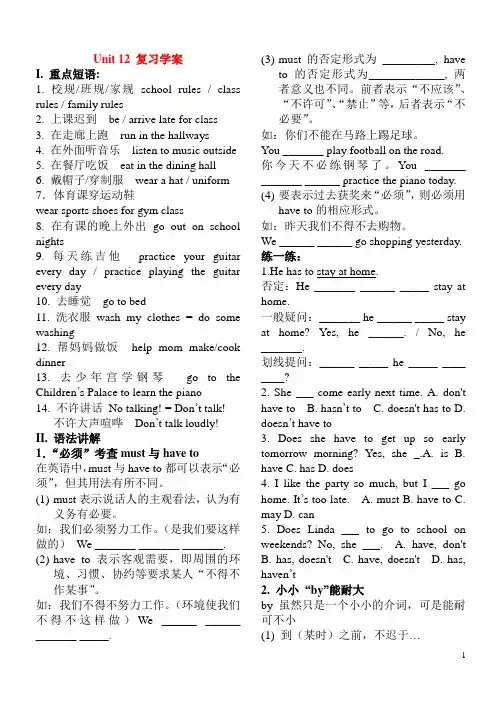
Unit 12 复习学案I. 重点短语:1. 校规/班规/家规school rules / class rules / family rules2. 上课迟到be / arrive late for class3. 在走廊上跑run in the hallways4. 在外面听音乐listen to music outside5. 在餐厅吃饭eat in the dining hall6. 戴帽子/穿制服wear a hat / uniform 7.体育课穿运动鞋wear sports shoes for gym class8. 在有课的晚上外出go out on school nights9. 每天练吉他practice your guitar every day / practice playing the guitar every day10. 去睡觉go to bed11. 洗衣服wash my clothes = do some washing12. 帮妈妈做饭help mom make/cook dinner13. 去少年宫学钢琴go to the Children’s Palace to learn the piano14. 不许讲话No talking! = Don’t talk!不许大声喧哗Don’t talk loudly! II. 语法讲解1.“必须”考查must与have to在英语中,must与have to都可以表示“必须”,但其用法有所不同。
(1)must表示说话人的主观看法,认为有义务有必要。
如:我们必须努力工作。
(是我们要这样做的)We _______ _______ _______. (2)have to 表示客观需要,即周围的环境、习惯、协约等要求某人“不得不作某事”。
如:我们不得不努力工作。
(环境使我们不得不这样做)We ______ ______ _______ _____. (3)must的否定形式为_________, haveto的否定形式为_____________, 两者意义也不同。
Unit 4 I want to be an actor学法与教法第一课时(Section A 1a~1c)一、学习目标:1. 掌握下列单词:assistant, sale assistant, doctor, reporter, police, officer,waiter, bank clerk , hospital, show, star, nurse, policeman2. 掌握下列句型:---What does he do ?---He’s a waiter.【学习重点】:what构成的特殊疑问句。
二、预读【预习重点】:1. 试读下列单词:assistant, sale assistant, doctor, reporter, police, officer,waiter, bank clerk , hospital, show, star, nurse2. 看图,将人物与他们的职业联系起来。
3. 朗读下列句子:---What does he do ?---He’s a waiter. My uncle w orks in that hospital.【预习练习】一、在下列单词的空格处填入字母,使单词完整,并在括号中写出汉语意义。
1. ____ ss___st___nt ( )2. s___l____ ( )3.d___ct___r ( )3. r___p___r t___r ( )4. p___l___c___( ) 6.__ff___c___r ( )7. w___ ___ t___ r ( ) 8. b___nk ( ) 9. cl___rk( )10. h___sp___t___l ( ) 11. n___ rs____( )12. p___l___c___m___n( )二、翻译下列句子。
1. 你想做什么?What _____ you _____ to _____ ?2. 她是做什么的?What _____ she ______ ?3. 她是一名护士。
新目标英语七年级下复习资料(金文华专辑)◆Unit 1.Where’s the post office?目标语言:ask for and give directions on the street重点句型:Is there a bank near here? Yes, there’s a bank on Center Street.Is there a supermarket? Yes, there is. No, there isn’t.Where’s the supermarket? It’s next to the library.The pay phone is across from the library.The pay phone is next to the library.The pay phone is between the post office and the library.The pay phone is on Green Street.Just go straight and turn left.It’s down Bridge Street on the right. It’s next to a supermarket.Is there a big supermarket near where you live?重点词组:across from, on the street, between…and…, next to, in the neighborhood, go straight, turn left, on the right(left), on the avenue, take a walk, in the hotel, the beginning of, have fun doing, on a bench, the way to, take a taxi, go down, go through, have a good trip,welcome to+n.,the way to+n去。
Unit8 教学设计一.词组1 想要做某事would like to dosth2一小 / 中 / 大碗面 a small/medium/large noodles3多大号碗的面条 what size bowl of noodles4哪一种甜品what kind of dessert5一大碗番茄牛肉面 a large bowl of tomatoand beef noodles6不同样种类的鱼 different kinds of fish7特色水饺 special dumplings8绿茶 green tea9冰激凌 ice cream10要我帮忙吗 Can I help you= What can Ido for you11.水饺店 house of dumplings12.甜品屋 dessert house13.来买你的水饺吧come and get your dumplings二重点难点1 would like的用法Would like=__________1.想要某物 _____________2.想要做某事 ___________________#Nancy wants some salad.=Nancy _____ _____ some salad# Do you want to have some tea(同义句转换 ) _____ you _____ to ____ some tea?# I ’d like some onions(一疑)_____ you______ _____ onions?要注意回答方式:如上题,必定:___________否定 : ________________Would you like to go with ?必定回答: ________________# I ’d like some porridge and onions(划线)_________ _______you _______ ?# They would like some coffee (否定句) They ____ ______ _____ coffee.2 what size意为多大尺寸,多大型号1 They ’ d like large shoes_____ ____ _____ ____ they _____I ’ d like a medium bowl of noodles___________ ______ of noodles ______ ______________?3 kind的用法1) what kind of的意思是什么种类,那种的,用来咨询事物的种类。
新目标七年级英语(下)期末复习学案Unit 1 Where’ s your pen pal from?一.短:1 . be from = come from 来自于 ---- 2. live in 居住在 --- 3. on weekends 在周末4 . write to sb = write a letter to sb 某人写信;写信某人5 . in the world 在世界上 6.in China 在中国7. pen pal 笔友8. 14 years old 14 9.favorite subject 最喜的科目10. the United States 美国the United Kingdom 英国New York 11. speak English 英 like and dislike 憎9. go to the movies 去看影play sports 做运二.重点句式:1 Where ’ s your pen pal from? = Where does your pen pal from/2 Where does he live?3 What language(s) does he speak?4 I want a pen pal in China.5 I can speak English and a little French.6 Please write and tell me about yourself.7 Can you write to me soon? 8 I like going to the movies with my friends and playing sports. 三.本元的国家,人民、言。
1 Canada---- Canadian---- English / French2 France------ French------French3 Japan------Japanese----Japanese4 Australia----Australian----- English5 the United States------ American---- English6 the United Kingdom---British----- EnghishUnit 2 Where ’ s the post office?一. A sking ways: ( 路 )1. Where is (the nearest) ?⋯⋯(最近的)⋯⋯在哪里?2. Can you tell me the way to ?⋯⋯你能告我去⋯⋯的路?3. How can I get to ?⋯⋯我怎到达⋯⋯呢?4. Is there ⋯⋯ near here / in the neighborhood?附近有⋯⋯?5. Which is the way to ?⋯⋯哪条是去⋯⋯的路?二. Showing the ways: (指路)1. Go straight down / along this street. 沿着条街一直走。
U nit 5I’m watching TVI. Guide to Unit 5(单元导航)1.本单元以“What are you doing?”引出话题:谈论人们正在做什么?使学生们学会如何了解或表述目前的一种状态,这即是现在进行时,它表示说话时正在进行的动作或发生情况,而一般现在时表示经常性的状况或事情.通过本单元学习,主要掌握:1)Key words:watching,cleaning,playing,swimming,shopping,reading,eating,pool,school,mall,librar y2)target language:a: What are you doing?I’m watching TV.What are they doing?They’re cleaning the room.What’s he doing?He’s doing his homework.What are Dave and Mane doing? They’re reading.b: Do you want to go to the movies?That sounds good.c:When do you want to go?At three o’clock.3).Grammar:a.现在进行时b.一般现在时c.一般疑问句及其简单答语4).Ability request:To freely talk about or learn about what they are doing at the momentII.Learning methods.()1.Listen,look,say and write.2.Talk about the activities in groups and finish tasks.3.Preview before the next class.4.Make surveys and me what we’ve learnt in our life.III.Task design.()1.Ask students to make surveys abut what their families or friends are doing whenthey are calling. Then make a report.2.After school ask students to visit a park or train station or other public places .Askstudents to draw pictures or write a short passage about what people are doing at that moment.example report:We are in the supermarket. A man is walking with his wife. A woman and her daughter are looking at some cups. Two people are talking in front of the shelf.And a baby is crying.IV. Unit periods:The first period: Section A.1a-2c & self check 1.2The second period: Section A.3a-4. & just for fun.The third period : SectionB.1a-2c & self check 1.3The fourth period:SectionB.3a-4The first period:Teacher’s activities1. Greet to students.2. Ask about date or day.3.Ask about students favorite sports or other activities such as,watching TV,reading, playing ,computer games, etc. At the same time, teacher may write these verb phrases on the blackboard or put up the pictures about these.1.Show some pictures withsome activities in them tostudents.T: What do they do?What does she/he do?What does he like doing? 2.Teacher leads to ask andanswer:-What are they doing?-They are eating.-What’s he doing?-He is reading.3.Teacher may write thesewords on the black board,then ask students to add-ingto the words.Show:1)play-playing watch-watching clean-cleaning read-reading talk-talking do-doing2) have-having write-writing3)stop-stoppingswim-swimming4.Teacher shows anothergroup of verbs:Lie-lying tie-tying die-dying Students’ activities1. Greet to the teacher.2.Answer about the date or day.3.Tell the teacher and otherstudents about yourfavorite things.eg:play basketball/soccer.watch TV,read stories,goshopping,clean rooms,swim,do homework,writeletters, etc.1.Look at the pictures and tryto talk about these pictures. S: They clean the house.He watches TV.She likes reading.2. Try to think over and answer teacher’s questions as man y as possible.Step IStep II3.Read and remember thewords and then add-ing tothem.Students may try to find thechanging rules.Work ingroups. Then tell other how tochange a verb into-ing forms.Step II 4.Try to find the rules.Then read and remember. They may look up the dictionary and find the meanings.1.Task1 <Guessing game>Ask four students to sit in the front of the class.Try not to let others find what he or she is doing.<This game may operated bythe teacher. It’s also played bythemselves if Step III studentspossible.>Guess what the students are doing.Language needed:1. -***, are you reading?-No, I’m not.2.–Is *** eating?-No, he isn’t..-Are they doing their homework?-Yes, they are.2.Ask students to finish theguessing game one by one. Tryto make more chances topractice speaking English forstudents.Listen, look and say.Step IV Have a listening practice.Homework:1.Finish self-check 1.2.2.Write more than tensentences according to thepictures of 2c on Page26.3.Make a survey:After school, please ring upyour families or friends,Seewhat they are doing at thatmoment.What theytime namesare doing7:50p.m.9:00Step V教后记They second periodStep I Teacher’s ac tivities1.Greet to students.Students’ activities1.greet to the teacher.2.Ask:-class, what are you doing?-Are you/Is ** reading English?<To revise what we have learntlast class>Task 1.T:class,now I want you tophone your friends.You maysuggest him or her to dosomething you like, OK?Now,please discuss whatexpressions we’ll use to expressyour suggestions.T:Now,let’s try to call yourfriends. Prepare the materials inyour groups.Then act in front Step IIof others, OK?Language needed:-What are you doing?-I’m…..-Do you want to ……?-Sure/OK/Glad to.Whattime/When do you want to go.I think we’d better…What about <doing sth>?Oh, sorry, I don’t like…I would lik e to …Task 2. Tell the story.Look at the pictures on Page 27and answer the followingquestions.1)Where is it in the pictures? Step III2)Who is in the pictures?3)What are they doing?Please try to tell the story toothers.2.Answer :-We’re having an English class. -No, he isn’t.Finish the task.Work in groups at four.Try to discuss.What expressions they will use for example.Do you want to …?What are you doing?Let’s…OK.Prepare in groups or pairs. Then act and practice the conversations bravely.Others may correct each other.Read the pictures on Page27. Try to answer the teacher’s questions.Homework design. Step IV Work in groups.Students may teach themselves or each other. Try to get ready.Please be brave and be careful. Homework:Write the short story after class. Try to make correct sentences.Teacher’s activities 1. Greet to the students.The third periodStudents’ activities1. Greet to the teacher.2. Try to practice conversationswith the correct tense.Pay attention to :be+vingStep I 2.Show some pictures withsome activities in them tostudents.Practise thepresent continuing tense:-What’s he doing?-He’s swimm ing.-What are they doing?- They are reading English. Play the guessing game.To get students to guess what one of the students are doing.Step IITask:1.learn to describe differentpictures.Request:1.Show the pictures<onpage28>to students.Ask students to watch Step III pictures carefully.2.Everybody should try tosay something about thepictures as much aspossible.2. To finish the chart <la>.One of the students may act in the front.Keep doing that until others can guess what he is dong.Language needed:Are you swimming?Are you reading?Are you listening to music? Read pictures and try to say something as much as possible. Make sure students’thoughts can be shown clearly and correctly.Language needed:E.g.:1.Look!There is a people inthe river. He’s swimming 2.Where are the people?They are in the supermarket.What are they doing?They are shopping.3.Ask students to make conversations about these pictures.Make sure they can use the correct nguage needed:Where do people read books?They read books in the library.What are they doing in picture 3?They are reading books.What books are they reading?They are reading storybooks.4. Finish the listening practice. the two kids.2.Read a nd make the pictures’ideas clear.3.Think or discuss the phrasesor drills in groups.4.Try to describe the picturesin English.It’s time for stories!<self check3 >1.Ask students to discuss the pictures and make sure they can make the meanings Step IVclear.2.Teacher may show and example to students.Stress students to use correct tenses.Step V教后记Homework:1.To write eight sentences todescribe the pictures on page30.2.Write a diary to tell us whatyour family are dong when you are doing your homework.The fourth period.Teacher’s activity 1. Greet to the students.Students’ activities 1. Greet to the teacher.2.Revise and tell stories:Tell stories or tell something To ask several students to tell about your friends or families.Step II Step III Step IV Step V the stories according to the Language needed:pictures in our textbook. Or tell 1.He gets up at6:00every something about students’day.families. 2.It’s6:00.My mother is Stress them use the correct cooking.My father is Tenses and pay attention to watching TV. I am doing my “ving” and “vs”.homework.3.When do we go to a movie?We usually go to a movie onweekends.Task:To introduce photos to others.1.To describe photos that Especially tell others who thestudents have brought to people in the photos are and school.what they are doing.2.Student may try to saysentences as many aspossible.Language needed:1)Look ! This is me .2)I am playing basketball.3)That is my brother.He isplaying computer games.1.Have a listening practice. 1.Listen to the tape and read2.Finish 3b.3a.Try to underline the3.If we have plenty of time.activities and circle places.We may ask students to 2.Finish 3b and try to use the describe the pictures on correct tenses and page29.expressions.Task:Suppose someone is a journalistand now there is a big party inour classroom.Try to reportwhat is happening at themoment.Homework:1.To write a short passage todescribe what people aredoing in our school or in amarket.2.Finish the conversation.根据对话内容和首字母填空(杭州市中考题)A.What are you d________?B.I’m w_____ to my brother.A.W ____ is he ?B.He is i_____ Beijing.A. W _____is he?B. He is a collage s_______.A. What’s he s _______?B. He’s studying E_______.A. D_____ he often go home?B. No, he d________.教后记。
(第6课时:Revision--A & B)Teaching and Learning Goals and Evaluation :(一)目标目标1:通过复习本课的词汇短语和句子,能够读出和记忆和运用why,what,where 等特殊疑问词进行的句子提问,通过复习本课的注释,能够读出和记忆课后注释的句子,并能填词。
目标2:通过复习听力,能够完成判断和填词。
目标3:通过细读梳理文章脉络,能形成思维导图,并能借助思维导图复述2b 的文章,发展说的语言技能。
通过对S ection A ,3a和2b的复习,能够完成相应的语法填空及课文理解任务。
(二)评价任务&评价标准:(共100分)1. 背诵短语和句子。
能够默写出短语每个1分;能够完成课后句子填空,每空一分,满分32分.2. 通过A,2a-2b听录音,能够了解熊猫,狮子和考拉的特点和生活地点,并完成填空。
满分10分。
3. 借助思维导图复述泰国大象的特点和生存现状。
完成相应的语法填空,做笔记和大意总结任务。
满分30分。
4.完成语法填空,每空1分,共8分。
5.学生能够以“My favorite animal”为题写一篇文章,满分20分。
教学过程Step Ⅰ Greetings & leading in1.Greet the class as usual.2.Get the students to make conversations about the topic of this unit.Step IITask 1 Words and phrasesI. Review key words, phrases and sentences (Give Ss 5 minutes to review the new words and phrases in this unit )2.Dictation:dictate the following words and phrases: animal,kind of ,forget,get lost,be in danger,cut down,kill,friendly,over,(be) made ofplete the sentences with the words and phrases in the box.(2)The national ________ of Britain is in red,white and blue.(3)The letter”V”is a ________of victory.(4)Don’t ________animals. They are our fiends.(5)They have to ______________ the apple tree.(6)My pet dog is________. I can’t find it.(7)—Don’t _________to take your school bag home.—OK,Mr.Brown.(8)________six hundred students go to school by bike.(9)A park is a good ______for fun.(10)The sheep is __________;a tiger wants to eat it.(1)My pet dog can _____________()用两条腿走路(2)Koalas sleep ______(整天),and go out _________(在夜晚),(3)I think koalas are ______________(友好而且善良).(4)—____(为什么)dont you like cats?—Because they’re _______(懒惰的).(5)—Why _______he _______(喜欢)koalas?—Because they are __________(有点)cute. (6)—Where _____ lions ________(来自...)?—They are from ____________(南非).Task 3Reading1. Ask Ss to read 2b in Section B.2. Complete the passage according to Section B,2b.Hello, we are students ______ Thailand,and we want to _______the elephants. The elephants is ______ ______Thailand ’s __________. Our first________had a white elephant on it.This is a _________of good__________.Elephants are _________animals.They can play________or___________.They can draw very________.People say that ”An elephant never __________.”Elephants can _____ for a long time and never get ______. They can also remember places with ______and _________.This _________them to ________.But elephants are in ________danger.People cut________many trees ______elephants are losing their _______.People also _______them for their ________.Today there are only about ________elephants(over 100000 before).We must________the trees and not ________ things ________of ivory.Remember that March 13this Thai _________Day.1. Why 开头的特殊疑问句疑问副词why 在句中用来提问原因。
新目标英语七年级复习课范镇二中王霞Unit8 I’dlike some noodles〔复习任务〕1.能够掌握本单元的单词和“点餐”时所用句型。
2.能够运用本单元表达意愿的would like句型点你最喜欢吃的食物、并对涉及电话订餐时间和地址作出回答,同时能区分可数名词及不可数名词。
〔自主学习,基础回顾〕1.Words and phrases①面条________ ②洋白菜_______③土豆______pl_______④大的,宽广的______(反)______⑤饺子_______pl_______⑥粥,糊_________⑦果汁________⑧鸡肉________⑨原因________⑩菜单_________11)一碗面条____________12)橘子汁_____________13)绿茶____________14)想要,愿意___________15)饺子屋___________16)甜点屋____________17)一小/中/大碗面条_____________18)牛肉西红柿面_____________________2.Sentences and language points〈1〉你想要哪种面条?(P47 1a)_____________________________________________ 此句中kind作名词“种类”如:一种__________各种各样的___________同种类的_______ 另外,kind还可作形容词“友爱的”,如:她是个可亲的女孩。
______________________________也可作副词“有点儿,稍微”。
如:熊猫有点逗人喜爱。
____________________________________〈2〉我想要牛肉面。
(P48 2c)________________________________________________ 译:牛肉和西红柿面条_____________________加羊肉和土豆的面条__________________ 〈3〉---他想要多少(多大碗装)的面条?________________________------(P48 Grammar Focus)---他想要一小碗/中号碗/大碗面条。
____________________________________-----------句中would like没有人称和数的变化〈4〉饺子屋,饺子店_________________甜点屋________________(P51 3b)〈5〉我们有一些特色菜。
(P51 3a)_____________________________________________句中special作名词“特别之物,具有特色的”3.Passage(P49 3a)〈1〉:Can I help you?_________〈2〉:What kind of noodles would you like?________〈3〉:We have beef,chicken,muutton,cabbage,potato,tomat o…_________〈4〉:Sure。
And what size would you like?__________〈5〉:We have large,medium and small bowls。
__________选项:A:What kind of noodles do you have?B:Oh,a medium bowl,please。
C;OK,I’d like mutton and potato noodles,please。
D:I’d like some noodles,please。
E;What size do you have?4.Reading(P51 3a)At the House of Dumplings!w e__some great specials!Special 1 has beef and onion, and is just 10 RMB for 15 dumplings。
Special 2 is only 8 RMB FOR 15,and has__and mutton。
Orange__is only 2 RMB。
The dumpling and__lunch special is 10 RMB。
Come and get your__today!〔合作交流,能力拓展〕小组讨论:本单元两组词的异同。
1.Would like和like相同吗?would like:________________________________________________________________________like:___________________________________________________________________________ ____他不想要米饭。
(指现在)___________________________________________他不喜欢米饭。
(指平时)_____________________________________________2.辨别:large与bigLarge:__________________________________________________________________________-- Big:____________________________________________________________________________那头象很大。
__________________________一个大房间_________________________他是个大人物。
____________________________________〔语法聚焦,难点突破〕一、Would like意为“____/____”,would 和like结合表达一种__________语气,没有__________的变化。
其意义用法相当于__,一般有三种结构形式:_____想要某物(直接跟名词)______想要干某事(跟动词不定式)________想要某人干某事其疑问式将__提到__之前,句尾加句号构成。
其肯定回答是___/___/___等,否定回答是_____。
如:1.我们想要些茶。
_____________________________________________________2.我们想去动物园。
_________________________________________________3.我想让你休息一下。
_________________________________________________4.你想要些东西吗?________________________________________________________二、名词名词按其所表示的事物的性质分为_____________和______________。
____________有复数形式,______________没有复数形式。
请将本单元名词列举如下:可数名词: ___________________________________________________________不可数名词: __________________________________________________________既作可数名词又可作不可数名词:__________________________________________〔中考链接,质疑解惑〕1.Would you lik e___?A.drink something B。
something drink C。
something to derink D to drink anything 2.I often eat some__and __for breakfast。
A.eggs,bread B。
egg,bread C eggs,breads D breads,egg3.改错:①She would like something eat.②How many bag of rice do you want?③Can you see any milks on the table?④I don’t like some oranges。
〔当堂检测,自我评价〕一、完型填空。
(共10分,每小题1分)Kate is a little girl. She is not ____1____ . She ____2____ how to read ____3____ write. But her sister Mary is a ____4____ . She is ten.One day, Mary ____5____ her little sister in the room. She’s at the table. There is a pencil in ____6____ hand(手). She is ____7____ .“What are you doing, Kate?” she asked.“I’m writing ____8____ my friend, Rose,” says Kate.“____9____ how can you? You don’t know how to write,” says her sister.“Well,” says Kate, “It doesn’t matter.(没关系). Rose doesn’t know how to __10__ , either(也).”二、书面表达习作提示:Kate来自美国,现与父母一起居住在中国。
请以第一人称的口吻介绍Kate的饮食爱好,不同的吃饭时间和地点,不少于50字。
Food_______________________________________________________________________________ _______________________________________________________________________________ _______________________________________________________________________________ _______________________________________________________________________________ _______________________________________________________________________________ _______________________________________________________________〔收获与自我反思〕_______________________________________________________________________________ _______________________________________________________________________________教师寄语: The shortest answer is doing.七年级(下)Units 9-10 复习学案泰安十四中张立松方伟【复习任务】1.能熟记本单元的单词和短语,并结合本单元的句子熟练运用所学知识点。